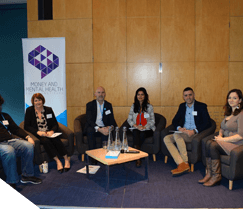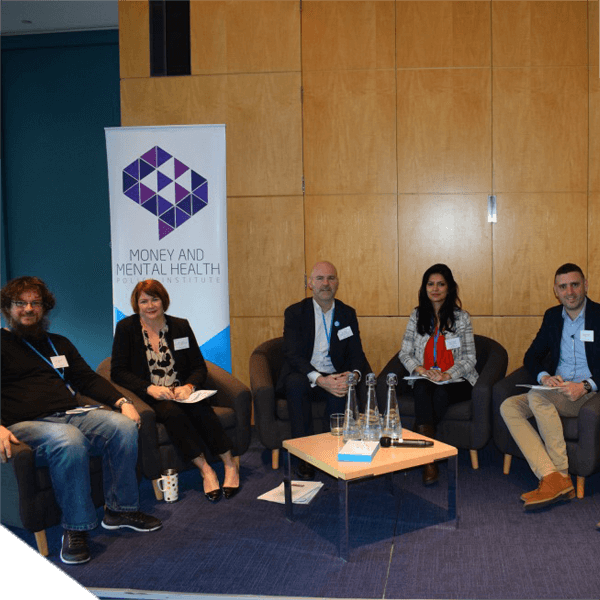
The launch of ‘Seeing through the fog’
On Tuesday we launched Seeing through the fog, our new report setting out for the first time the ways in which different mental health problems can affect people’s financial capability, and how banks and other service providers can help. To launch the report, we brought together nearly 100 experts from financial services, energy companies, the health system, regulators and others to take part in a discussion about the research and its implications. We are very grateful to Barclays for hosting the event, and to our panelists and attendees for their time and ideas. We were delighted to see such enthusiasm from a range of important sectors, and we’ll be working hard to translate this into meaningful change for people with mental health problems.
What does the report say?
Seeing through the fog looks at the range of ways in which mental health problems can make it harder for people to manage their money, making important financial tasks like comparing different products and paying the bills on time much more difficult. For instance, we found that people with PTSD often have memory problems, which can make remembering PINs and online banking details impossible, and that conditions such as ADHD and depression are associated with reduced attention span, which can make it harder to engage with complex financial tasks like budgeting.
The main message of our report was that these difficulties are not insurmountable. Just as companies provide wheelchair accessible branches or textphone services to ensure equal access to those with physical health problems, they have a responsibility to accommodate the needs of people with mental health problems too. We set out a range of adjustments that could be offered by financial services providers, and others, to help people with mental health problems to overcome the extra challenges with money management that they often face.
“Just because a person has an illness…it doesn’t mean that that is automatically accompanied by a set of unsurmountable problems.”
Wide-ranging benefits
One of the striking messages from the launch event was that many of the adjustments suggested in Seeing through the fog could yield wide-ranging benefits to other consumer groups, beyond those with mental health problems. Emanuel Andjelic, Chair and Co-founder of Squirrel, a budgeting tool, described how his product was inspired by a family member who struggled to build up savings, but could also be useful for people whose mental health problem leads to impulsive spending.
Similarly, Elaine Draper, Director of Accessibility and Inclusion at Barclays, told us that they had developed configurable debit cards for the mass-market, allowing customers to turn features like online shopping on or off; a tool that’s available to all but may have particular benefits for people with mental health problems who want extra control of their finances. Elaine advocated the development of money management products that would help all consumers, but that are designed inclusively, offering additional features to support consumers with additional or different needs.
“When you concentrate and think about more complex or extreme needs, actually you start to see and create solutions that benefit all customers.”
Joined up working
Meghna Tewari, Head of Consumer Vulnerability Strategy at Ofgem, provided an interesting regulatory perspective. She explained how Ofgem seeks to share best practice and build understanding to drive improvement in their sector, and also highlighted the value of collaboration between regulators who are often facing many of the same issues. The need for joined-up working was best articulated by Dan Holloway, who spoke passionately about his own lived experience of mental health problems. Dan pointed out that people’s mental health problems don’t vary based on the company or industry that they are interacting with, so nor should the support they are offered. He raised the important point that disclosing a mental health problem can be difficult, so we should do all we can to reduce the number of times a person has to do so – either by appropriate information sharing or by reducing the need for disclosure in order to access the tools that might help.
“I want to know that when I choose a product that works for me, a well-meaning “why?” will not force me to disclose things that I’m not comfortable with.”
The importance of listening
Seeing through the fog identifies common ways in which different mental health problems can affect people’s financial capability, but it is important that this is seen as a guide, and not a set of instructions. Brian Dow, Director of External Affairs at Rethink Mental Illness, emphasised the importance of listening to people’s individual needs. People with mental health problems are all different, and even within the same diagnosis, will have a range of different needs and preferences.
We hope that Seeing through the fog can help to improve general understanding of the effects of mental health problems on financial management, and what can be done to help. But it is essential that service providers listen to customers as individuals to work out what sort of support, if any, is appropriate in each individual case.
